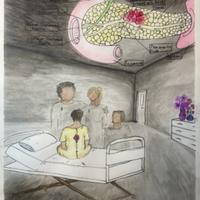The Aftermath, 2024
Title
The Aftermath, 2024
Subject
Pancreatic cancer
Description
Artist statement:
The intention of this piece is to make the viewer feel the aloneness and detachment from reality, while fighting a losing battle. The enlarged diagram of the pancreas is used to educate the mass with a visual of what it actually looks like and what organs are attached, while simultaneously color coordinating with the patient's hospital gown with where the pancreas is located (behind the stomach). The family is suggested, showing that they are there for the patient, but cannot fully be there with them since they cannot stay overnight past visiting hours, and the patient is alone in the procedures and with treatments. The purple ribbons and the flower bouquets relate to the Pancreatic Cancer Awareness Ribbon color, showing support in their uphill battle. The patient themselves is smaller, as chemo and dietary restrictions take its toll. While working on this, my friend’s young niece was undergoing chemotherapy for her pancreatic cancer, so I was able to talk to a direct family member about the feelings and emotions felt while seeing their family go through the struggle that is pancreatic cancer.Medical description:
In pancreatic cancer, the mutation arises due to a genetic mutation in the pancreas. The scientific name of this formation is called pancreatic ductal adenocarcinoma. Pancreatic ductal adenocarcinoma is an aggressive mutation that causes the formation of the tumor thus creating a negative domino effect on the body. Because this tumor is growing on the pancreas, it blocks the pancreas from fully functioning due to it blocking receptor sites in the body. This as a result will cause adverse effects such as diabetes, abdominal pain, and weight loss. External factors such as smoking have been linked to this cancer due to its harmful chemicals.In early stages of pancreatic cancer, the patient may experience little to no symptoms. As the cancer advances, more symptoms of the cancer appear. Unfortunately, this is why pancreatic cancer has a higher percentage of being diagnosed in advanced stages.Creator
Jochetz, Charlotte
Date
2024
Contributor
Atiati, Anita; Avellaneda, Karen; Pulido, Christine; Ramirez, Stephanie; Tran, Vincent
Rights
In Copyright- This Item is protected by copyright and/or related rights.
Format
Watercolor on paper ; 11 x 14 in.
Citation
Jochetz, Charlotte, “The Aftermath, 2024,” TWU Digital Exhibits, accessed October 18, 2024, http://exhibits.twu.edu/ex/items/show/314.
